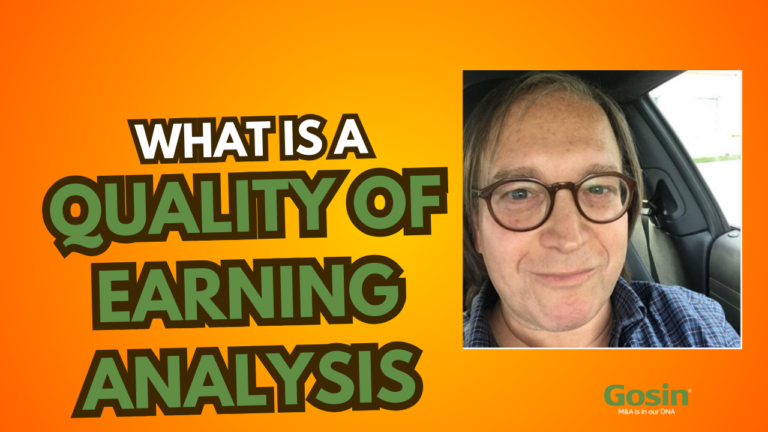In selling your business, you must decide whether to sell your company to a financial buyer vs strategic buyer. There are primarily two different types of buyers for a business – strategic buyers and financial buyers. Some businesses can be sold either to a strategic or financial buyer, but that’s not always the case. This essay explains the differences between strategic and financial buyers. It then identifies the characteristics of a business ideally suited to be sold to a financial buyer vs strategic buyer. Finally, it proposes some advantages and disadvantages for selling to each type of buyer.
What is a strategic buyer?
A strategic buyer is a company that buys another business to enhance the strategic buyer’s existing business. Most typically, strategic buyers are your competitors, suppliers, or clients. A strategic buyer is strategic because it’s acquisition of your company is strategic for the buyer in some way. For example, it may enable the buyer to offer more products or services. Additionally, it may serve as a foundation for geographic expansion. Further, it may tuck-in to the buyer’s existing operations resulting in valuable synergies for the buyer.
What is a financial buyer?
A financial buyer is an investor, whether a private equity fund, a family officer or an individual. Private equity funds pool capital from numerous investors. PE fund investors typically include university endowments, pension funds and high net worth individuals. Family offices pool capital for a single high net worth family or multiple families. However, PE funds and family offices usually don’t operate the businesses they acquire. Instead, they rely upon existing management teams. Sometimes, financial buyers recruit seasoned executives to supplement the seller’s management team or fill-in gaps.
Is a strategic or financial buyer right for your business?
Whether you should sell your business to a strategic or financial buyer depends on three primary factors. First, whether you have the people, systems and processes to thrive in a financial-buyer-backed-business environment. Second, whether your objective is to exit and move on to another business or to retire. Finally, your personality is a factor. I’ll address each of the three considerations in turn.
Necessary infrastructure for financial buyers.
Financial buyers are typically highly sophisticated, well educated and systematic in their approach to managing a business. When a financial buyer acquires a business as a platform, it rarely intends to actively operate the business. A platform is an initial acquisition that serves as a foundation for future growth.
Financial buyers will certainly want board representation. Indeed, they’ll usually seek to control of the board of directors. In contrast, financial buyers usually rely on existing management to operate their acquired business. Nevertheless, they often supplement existing management with seasoned professional managers.
Accordingly, if your business lacks a talented management team, you’re probably going to be unable to sell to a financial buyer. Financial buyers also require communication with management to discuss performance. If you lack the technology, systems or processes to manage key metrics, you probably shouldn’t sell to a financial buyer. Experienced management and well-established systems and processes are crucial to attracting a financial buyer for your business.
Do financial or strategic buyers pay more.
You need to consider whether a financial buyer would pay more than a strategic buyer for your business. Though a strategic buyer may derive synergies from an acquisition that would be unavailable to a financial buyer, strategic buyers don’t necessarily pay more for a business than financial buyers. Because of their vast equity commitments, financial buyers have strong relationships with lenders and can use it to pay higher purchase price multiples. So, for argument sake lets call it even for a financial buyer vs strategic buyer.
Are you willing to roll over any equity?
There’s another factor for sellers to consider. Most financial buyers expect the seller to roll over a portion of the purchase price in the form of equity in the buyer. Some sellers want to do so. It provides the opportunity for a second bite at the apple when the financial buyer resells the business. Financial buyers are often able to grow businesses aggressively in short periods of time. Because of their clout they’re usually able to use financial arbitrage to juice their returns. In plain English, financial sponsors typically can sell the business in a few years at a higher multiple than they paid you for it.
A benefit in selling to financial buyers.
Indeed, a number of years back I served as an M&A advisor to a large private equity fund in connection with their acquisition of a business whose name I won’t mention. The owner had built a great business. For argument sake, lets say that company’s EBITDA was around $10 million at the time my PE-fund client acquired it. The buyer valued the business at approximately $80. The Seller retained a 20% ownership interest in the business.
After closing, the PE-fund recruited a seasoned CEO. He had previously managed a large company in the same industry. The seller retained a board seat but essentially turned over control of the business. Three years later, when EBITDA had increased to $30 million or more, the PE fund sold the company to another PE fund for several hundred million dollars. The original owner’s retained equity stake netted him more money in round two than he received in the initial sale.
Some sellers are unwilling to roll over any equity
But, clearly, rolling over equity is not ideal for everyone. Some sellers want to cash in all their chips and move on to another business venture or focus on the things they’ve had to ignore while building their business – like travel, recreation, charitable work, hobbies or the pursuit of other interest. Selling to a financial buyer is inadvisable unless you’re willing to roll over a portion of your equity. A strategic buyer is likely the right choice if you don’t want to roll over any equity. Indeed, its relatively easy to resolve the financial buyer vs strategic buyer question in that scenario.
Personal considerations
Lastly, its important to reflect on your own personality in determining whether a financial or strategic buyer is right for you. Working with a financial buyer requires the flexibility and willingness to accept multiple viewpoints and to accept in many cases that the buyer will have final say even if you strongly disagree. Many business owners are used to being the “king of all things.” Simply stated, it’s hard for such individuals to adapt to running ideas past others before taking action. Some owners also find it difficult to adapt to data-driven decision making as opposed to operating from the gut.
Conclusion
It’s important to understand the universe of potential buyers before beginning to market your business for sale. IConsidering a financial buyer vs strategic buyer is therefore a threshold question. You also need to carefully consider the financial and personal implications of selling to a financial buyer as opposed to a strategic buyer. An expert M&A advisor, like those at Gosin M&A, can help you assess the considerations, and we do so for all our clients.
If you’re considering selling your business or you’d in learn more about whether the right buyer is a financial buyer vs strategic buyer, please contact us.





